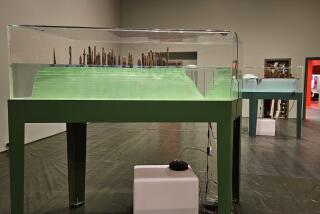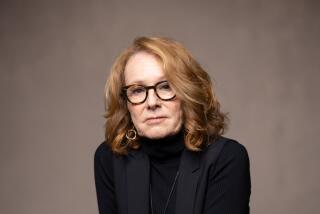MOCA board exits pile up
The troubles of L.A.’s Museum of Contemporary Art intensified with the resignation of noted artist John Baldessari from its board.
“To live with my conscience, I just had to do it.” Baldessari’s said in an interview Thursday after emailing his decision to MOCA. He said his reasons include the recent ouster of respected chief curator Paul Schimmel and news this week that the pop-cultural slant the museum has taken under director Jeffrey Deitch will continue with an exhibition on disco music’s influence on art and culture.
“When I heard about that disco show I had to read it twice. At first I thought ‘this is a joke’ but I realized, no, this is serious. That just reaffirmed my decision,” he said. MOCA officials did not respond to requests for comment before deadline.
Baldessari is the fifth MOCA board member to leave since February. His exit after 12 years is another signal that the old guard of L.A.’s contemporary art scene has grown disenchanted with its direction under Deitch.
In a joint letter to The Times Thursday four of MOCA’s “life trustees” called for a U-turn back to the kinds of exhibitions it was famous for before Deitch’s arrival two years ago.
The letter from trustees Lenore S. Greenberg, Betye Burton, Audrey Irmas and Frederick M. Nicholas disagreed with a column by Eli Broad Sunday on The Times op-ed page. Broad, a MOCA life trustee who is the museum’s biggest donor, wrote in support of its direction under Deitch. “The celebrity-driven program that … Deitch promotes is not the answer,” the letter said.
The life trustees (an honorific title conferred for lasting, high-impact support for the museum) questioned whether the art community will support Deitch’s approach. Without naming Schimmel in the letter, they called for a renewed commitment to shows steeped in art history that had been the museum’s signature during his 22-year tenure: “MOCA needs to get back to its core mission and to the kinds of programs that made it the exemplary contemporary art museum it once was.”
Among the five board members who have left this year is Jane Nathanson, a key organizer of many MOCA fundraising events going back to the 1980s.
Unlike Baldessari and the trustees who wrote the letter, Nathanson said the reason for her resignation in March was not Deitch’s exhibitions, but his inexperience as a fundraiser, and the concentration of power in too few people — especially Broad.
Like other MOCA life trustees Broad has no official vote, but his $30-million bailout of the museum when it was financially dead in the water at the end of 2008 has given him a considerable say in its budgeting; he played a key role in hiring Deitch.
“Art in the Streets,” a Deitch-orchestrated survey of the graffiti and street art movement that drew a record 201,000 visitors, Nathanson said, “was really smart and a terrific show. Jeffrey is fantastic on the creative side of running a museum, but part of being director is fundraising, and I’m not so sure his strength is fundraising.”
Nathanson said that when she resigned from the board, “I didn’t step off because of any one incident or because I had a fight with any person.
“You don’t have a cohesive board there that feels engaged and included at MOCA anymore,” she said.
After Broad’s 2008 pledge kept MOCA from being merged with the Los Angeles County Museum of Art, “it sort of became a one-man show there,” said Nathanson, who had favored the merger. “It’s difficult to maintain engagement on the part of the entire board when the decision-making is limited to a few.”
The museum’s board had reached 40 voting members in mid-January, after the addition of New York hedge fund chief Steven A. Cohen. Now the voting roster is down to 35, following the departures of Baldessari, Nathanson, Steven F. Roth and Gary and Kathi Cypres.
MOCA board members commit to donating at least $75,000 a year to the museum or raising it from other sources; new trustees are required to pay an entry fee of $250,000 if they live in Southern California or $150,000 if they live out of town. Life trustees are not required to pay dues. Baldessari was one of four noted artists on the board, along with Ed Ruscha, Barbara Kruger and Catherine Opie; he said artist trustees aren’t required to pay dues, so “they’re not losing any money on me.”
Nathanson and Roth remain trustees of the Los Angeles County Museum of Art; Wallis Annenberg, who joined the MOCA board last September, is now the only person on the boards of both museums. Nathanson and her husband gave LACMA $10 million in 2007, in honor of the opening of its Broad Contemporary Art Museum.
Nathanson said that one of her dreams for MOCA had been a major renovation of the larger of its two downtown buildings, the Geffen Contemporary, a city-owned former auto repair warehouse that Frank Gehry repurposed as the museum’s initial facility in 1983.
Climate control issues and other building-related problems make the 55,000-square-foot Geffen, which has more than double the exhibition space of MOCA’s Grand Avenue headquarters, unsuitable for permanently displaying collection items. Nathanson had hoped that a big renovation campaign would not only provide MOCA with space to show many more of its vaunted holdings of post-World War II art but would give it a rallying point to fundraise its way out of fiscal doldrums while also eliminating the expense of operating two sites.
But she said the idea of closing the Grand Avenue museum ran up against Broad’s vision of developing crowd-drawing synergy between the MOCA headquarters and the $130-million Broad Collection museum he is building across the street for his own major collection of contemporary art, with an expected 2014 opening.
Along with the board departures and Schimmel’s forced resignation, in June MOCA laid off five other staffers as the museum lowered its budget for the coming year to $14.3 million, the leanest since the late 1990s.
David Johnson, the MOCA board’s co-chairman, noted that nine new trustees have joined the board since Deitch became director in June 2010, and that all of them except Gary Cypres remain. He said that two “really great” prospective board members have agreed to join and are expected to be voted in at the next quarterly meeting.
“We’re sad whenever anyone, after service, no longer continues,” Johnson said Wednesday before Baldessari’s resignation. “But I don’t think this is unusual. I don’t think it’s something we’re concerned about.”
More to Read
The biggest entertainment stories
Get our big stories about Hollywood, film, television, music, arts, culture and more right in your inbox as soon as they publish.
You may occasionally receive promotional content from the Los Angeles Times.











